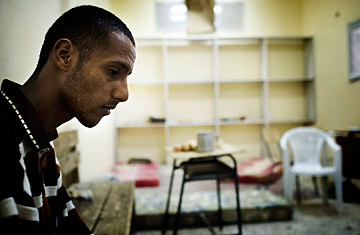
Omar, a soldier in the well-trained and widely feared private battalion of Gaddafi's son Khamis, held in captivity in Shahat on February 28, 2011.
Omar's young face is thin and strained. There are dark circles under his eyes. He says he lost a lot of weight during his six months of military training. "I used to be fat," the 19-year-old says, offering a weak smile.
The past two weeks have been a blur as eastern Libya overthrew the rule of Col. Muammar Gaddafi. "It has been devastating. I lost count of the days," he says, pressing his head into his hands with bewilderment. "I've been here for 10 days; maybe 10 days someplace else before that."
This is not Omar's revolution. A soldier in the well-trained and widely feared private battalion of Gaddafi's son Khamis, Omar says he was sent to the town of al-Baida in eastern Libya to participate in a pro-Gaddafi demonstration on Feb. 16. His captors say the skinny teen from Tripoli was sent here to fight. But in the fog of Libya's liberation war, no one may ever know for sure.
After his capture, he was detained with some 200 suspected mercenaries at the Aruba School in the eastern town of Shahat. All of them were later freed; on Monday, Feb. 28, Omar is the only one remaining. The school was their prison for over a week, after days of heavy clashes, when the rebels finally overran local military and security installations, and the remaining pro-government fighters surrendered.
Omar, like many others who were held here, was captured at the army base in al-Baida. All of the prisoners at the Aruba School had southern Libyan or foreign origins; they were dark-skinned, from towns deep in the Sahara desert. At least five were from Chad. And most had arrived in al-Baida on airplanes chartered from the Saharan town of Sabha, a known Gaddafi stronghold. Some, like Omar, identified themselves as soldiers in Khamis' Batallion, but no one admitted that they had come to fight. The Chadians said they had been tricked into boarding a free airplane to Tripoli that really took them to al-Baida. Others, like Omar, claimed they had come for a peaceful pro-Gaddafi demonstration.
"If they're wearing civilian clothes, it's difficult to tell who they are — if they're mercenaries or not," concedes Ahmed Noori Esbak, one of Omar's guards, and a prominent resident in town who says he fought pro-Gaddafi mercenaries in the streets two weeks ago.
That's part of why, on Sunday night, Esbak and the other residents of Shahat who have been guarding the Aruba School, decided to let their prisoners go; surrendering them to the guardianship of relatives who had journeyed for miles to pick them up. "We captured them. They were our prisoners. And we made the decision to set them free," Esbak explains.
The town's men say the prisoners were released in large part due to the murkiness of their situation. But they also say they feared retaliation from the tribes who were most strongly represented among their prisoners; tribes like the Fezzan of the southwestern Sahara, which Omar belongs to, or the Gaddadfa, Gaddafi's tribe. "We released them because they're all Libyans and we want people in the West and other regions to stop holding people from the East. It could start a tribal war otherwise," Ahmed Salem Salah, a teacher-turned-prison guard explains. If the Libyan opposition is to get through this period of turmoil, liberate Tripoli, and reach the final goal of a united, Gaddafi-free country, he reasons, now is not the time to hold grudges.
"If this was Gaddafi's system, we would have killed them and buried them in secret," Esbak adds. The guards all agree that the liberated East is far more humane.
But the question of who exactly the mercenaries are has yet to be answered. Opposition members in Benghazi have said they are holding hundreds of suspected mercenaries from the battles, but the press has been denied access to them. "Basically we know Gaddafi has in the past supported many African rebel movements, so it's not like he had to go and recruit an army. So we don't dispute that mercenaries were involved," Peter Bouckert, the director of emergencies at Human Rights Watch, told reporters at a Friday press conference. He spoke from the opposition's bustling headquarters inside Benghazi's High Court building, but he quickly added that the dozen suspects being held there were probably innocent. "Most likely [they] were not involved in the fighting, and they're just mixed up in a terrible situation," he said.
The rebels in al-Baida and Shahat claim that the pro-Gaddafi forces they fought against were highly trained. Omar, for his part, doesn't dispute receiving six months of grueling training for his elite force, though he still insists he sat out the fight. "Training was like being a slave. It was very hard," he says. The soldiers are regularly beaten because, he adds: "It's part of training. It's mean to make us resistant." He shrugs and says, "I know the one who hit me was hit before during his own training. And I just wanted to be a soldier and have a job."
